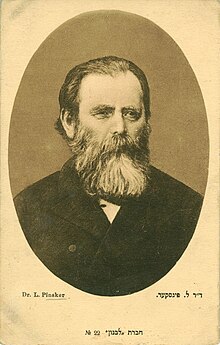Leon Pinsker
| Leon Pinsker | |
|---|---|
 |
|
| Native name | Russian: Лев (Леон) Семёнович / Йехуда Лейб Пинскер Yiddish: לעאָן פינסקער |
| Born |
13 December 1821 Tomaszów Lubelski, Kingdom of Poland |
| Died | 9 December 1891 (aged 69) Odessa, Russian Empire |
| Education | Law |
| Alma mater | Odessa University |
| Occupation | Physician, political activist |
| Known for | Zionism |
| Movement | Hovevei Zion (Zionism) |
Leon Pinsker (Yiddish: לעאָן פינסקער, Yehudah Leib Pinsker, Russian: Лев (Леон) Семёнович or Йехуда Лейб Пинскер, Lev Semyonovich Pinsker; 1821, Tomaszów Lubelski, Kingdom of Poland, Russian Empire – 1891, Odessa, Russian Empire) was a physician, a Zionist pioneer and activist, and the founder and leader of the Hovevei Zion, also known as Hibbat Zion (Hebrew: חיבת ציון, Lovers of Zion) movement.
He inherited a strong sense of Jewish identity from his father, Simchah Pinsker, a Hebrew language writer, scholar and teacher. Leon attended his father's private school in Odessa and was one of the first Jews to attend Odessa University, where he studied law. Later he realized that, being a Jew, he had no chance of becoming a lawyer due to strict quotas on Jewish professionals and chose the career of a physician.
Pinsker believed that the Jewish problem could be resolved if the Jews attained equal rights. In his early years, Pinsker favored the assimilation path and was one of the founders of a Russian language Jewish weekly (see also: Haskala).
The Odessa pogrom of 1871 moved Pinsker to become an active public figure. In 1881, a bigger wave of anti-Jewish hostilities, many state-sponsored, swept southern Russia and continued until 1884. Then Pinsker's views changed radically, and he no longer believed that mere humanism and enlightenment would defeat antisemitism. In 1884, he organized an international conference of Hibbat Zion in Katowice (Upper Silesia, then part of the Kingdom of Prussia).
...
Wikipedia
